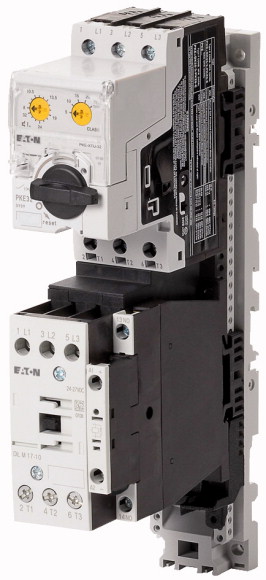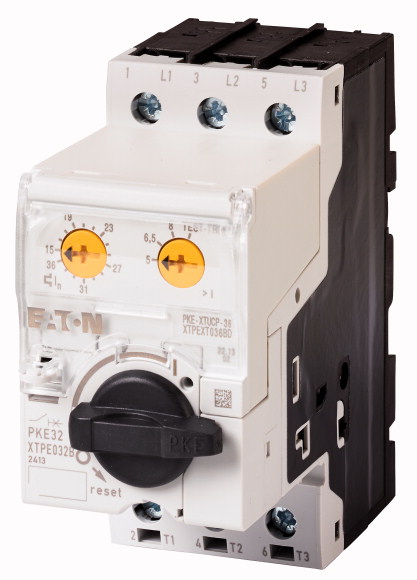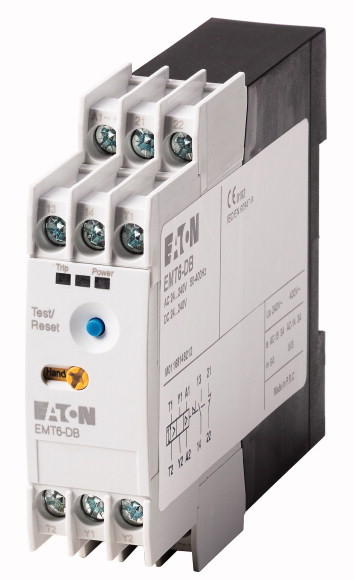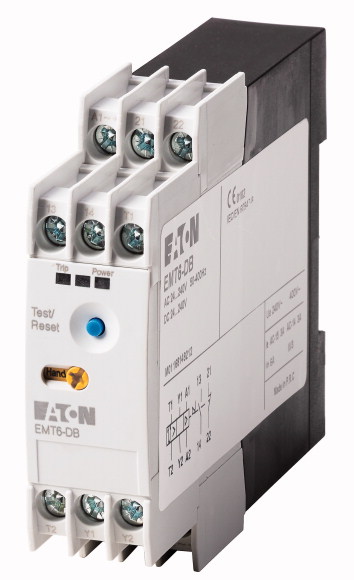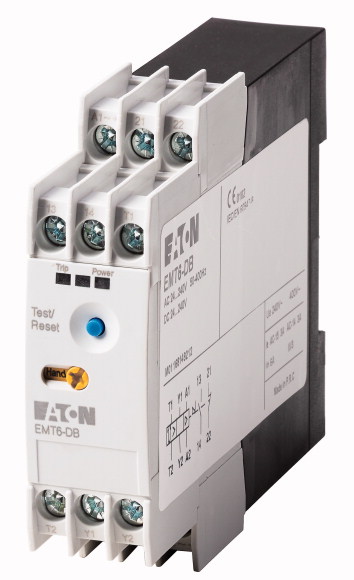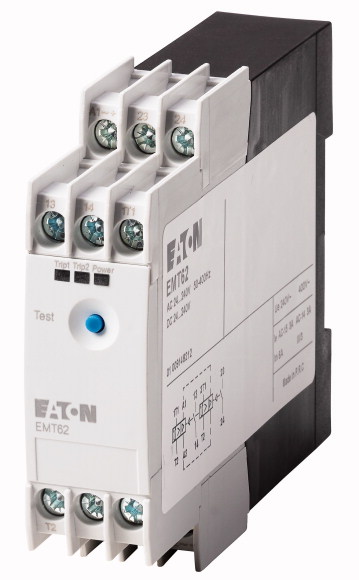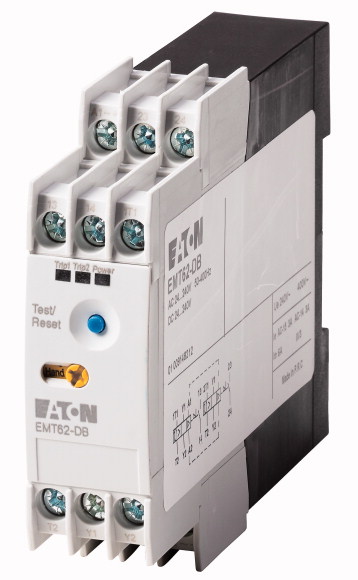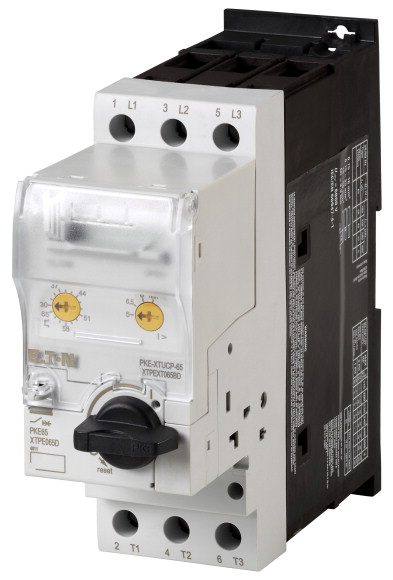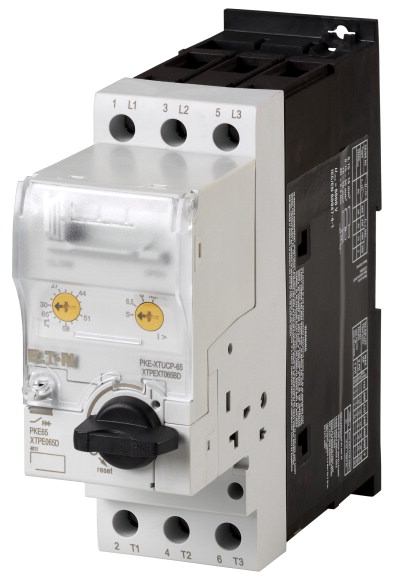| Basic function |
DOL starters (complete devices) |
| Basic device |
MSC |
| Notes |
 |
| Connection technique |
Also suitable for motors with efficiency class IE3.
IE3-ready devices are identified by the logo on their packaging. |
| Connection to SmartWire-DT |
Screw terminals |
Motor rating [P]
>AC-3
>380 V 400 V 415 V [P] |
no |
Motor rating [P]
>AC-3
>500 V [P] |
|
Rated operational current
>AC-3
>380 V 400 V 415 V [Ie] |
15 kW |
Rated operational current
>AC-3
>500 V [Ie
] |
18.5 kW |
| Rated short-circuit current 380 - 415 V [Iq
] |
29.3 A |
| Rated conditional short-circuit current 500 V [Iq
] |
28.9 A |
Setting range of overload releases [Ir] [Ir] |
100 kA |
| Coordination |
50 kA |
| Contact sequence |
|
| Actuating voltage |
8 - 32 A |
| Motor-protective circuit-breakers |
Type of coordination “1”
Type of coordination “2” |
| Contactor
|
 |
DOL starter wiring set
Mechanical connection element and electrical electric contact module |
230 V 50 Hz, 240 V 60 Hz |
| Notes |
AC voltage |
| Motor output/rated motor current |
PKE32/XTU-32 Type |
| Standards |
DILM32-10(...) Part no. |
| Mounting position |
PKZM0-XDM32 Type |
| Ambient temperature |
The DOL starter (complete devices) consists of a PKE motor protective circuit breaker and a DILM contactor. With the adapter-less top-hat rail mounting of starters up to 15 A, only the motor-protective circuit-breaker on the top-hat rail requires an adapter. The contactors are provided with mechanical support via a mechanical connection element. Control wire guide with max. 6 conductors up to 2.5°mm external diameter or 4 conductors up to 3.5°mm external diameter. From 16 A, the motor-protective circuit-breaker and contactor are mounted on the top-hat rail adapter plate. The connection of the main circuit between PKE and contactor is established with electrical contact modules. When using DILA-XHIT… auxiliary contacts with MSC-DE-... DOL starters, the plug-in electrical connectors can be removed without removing the front-mounted auxiliary contact. Cannot be combined with NHI‐E…PKZ0‐C. MSC-DEA... DOL starters are prepared for communications via SmartWire-DT. In order to be used this way, they first need to be expanded with the PKE-SWD-32 communications module. |
| Rated impulse withstand voltage [Uimp] |
Motor output | | Rated motor current | | | | | | | | |
|---|
| AC-3 | | | | | | | | | | | | |
|---|
| | 220 V 230 V 240 V | | 380 V 400 V | | 415 V | | 440 V | | 500 V | | 500 V with CL-PKZ0 | | 660 V 690 V |
|---|
| | Iq = 100 kA | | Iq =100 kA | | Iq = 65 kA | | Iq = 65 kA | | Iq = 50 kA | | Iq = 100 kA | | Iq = 3 kA |
|---|
| P | | I | | I | | I | | I | | I | | I | | I |
|---|
| kW | | A | | A | | A | | A | | A | | A | | A |
|---|
| | | | | | | | | | | | | | |
|---|
| 2.2 | | 8.7 | | - | | - | | - | | - | | - | | - | | 3 | | 11.5 | | - | | - | | - | | - | | - | | - | | 4 | | 14.8 | | 8.5 | | 8.5 | | - | | - | | - | | - | | 5.5 | | 19.6 | | 11.3 | | 11.3 | | 10.2 | | 9 | | 9 | | - | | 7.5 | | 26.4 | | 15.2 | | 15.2 | | 13.8 | | 12.1 | | 12.1 | | 8.8 | | 11 | | - | | 21.7 | | 21.7 | | 19.7 | | 17.4 | | 17.4 | | 12.6 | | 15 | | - | | 29.3 | | 29.3 | | 26.6 | | 23.4 | | 23.4 | | 17 | | 18.5 | | - | | - | | - | | - | | 28.9 | | 28.9 | | - |
|
| Overvoltage category/pollution degree |
|
| Rated operational voltage [Ue] |
IEC/EN 60947-4-1, VDE 0660 |
Rated operational current
>Open, 3-pole: 50 – 60 Hz
>380 V 400 V [Ie] |
 |
AC-4 cycle operation
>Minimum current flow times |
-25 - +55 |
AC-4 cycle operation
>Minimum cut-out periods |
|
AC-4 cycle operation
>Note |
6000 V AC |
| Motor protective circuit breaker PKZM0, PKE |
III/3 |
DILM contactors
>Current heat loss
>Current heat loss at Ie to AC-3/400 V |
230 - 415 V |
DILM contactors
>Power consumption of the coil in a cold state and 1.0 x US
>Dual-voltage coil 50 Hz [Sealing] |
32 A |
Short Circuit Current Rating
>Basic Rating
>SCCR |
500 (Class 5)
700 (Class 10)
900 (Class 15)
1000 (Class 20) ms |
| Rated operational current for specified heat dissipation [In] |
500 ms |
| Heat dissipation per pole, current-dependent [Pvid] |
In AC-4 cycle operation, going below the minimum current flow time can cause overheating of the load (motor).
For all combinations with an SWD activation, you need not adhere to the minimum current flow times and minimum cut-out periods. ms |
| Equipment heat dissipation, current-dependent [Pvid] |
|
| Static heat dissipation, non-current-dependent [Pvs] |
PKZM0 motor-protective circuit-breakers, see motor-protective circuit-breakers/PKZM0 product group
DILM contactors, see contactor product group
DILET timing relay, ETR, see contactors, electronic timing relays product group |
| Heat dissipation capacity [Pdiss] |
10.5 W |
| Operating ambient temperature min. |
2.1 W |
| Operating ambient temperature max. |
|
10.2 Strength of materials and parts
>10.2.2 Corrosion resistance |
5 kA |
10.2 Strength of materials and parts
>10.2.3.1 Verification of thermal stability of enclosures |
|
10.2 Strength of materials and parts
>10.2.3.2 Verification of resistance of insulating materials to normal heat |
32 A |
10.2 Strength of materials and parts
>10.2.3.3 Verification of resistance of insulating materials to abnormal heat and fire due to internal electric effects |
3.5 W |
10.2 Strength of materials and parts
>10.2.4 Resistance to ultra-violet (UV) radiation |
10.5 W |
10.2 Strength of materials and parts
>10.2.5 Lifting |
2.1 W |
10.2 Strength of materials and parts
>10.2.6 Mechanical impact |
0 W |
10.2 Strength of materials and parts
>10.2.7 Inscriptions |
-25 °C |
| 10.3 Degree of protection of ASSEMBLIES |
+55 °C |
| 10.4 Clearances and creepage distances |
|
| 10.5 Protection against electric shock |
Meets the product standard´s requirements. |
| 10.6 Incorporation of switching devices and components |
Meets the product standard´s requirements. |
| 10.7 Internal electrical circuits and connections |
Meets the product standard´s requirements. |
| 10.8 Connections for external conductors |
Meets the product standard´s requirements. |
10.9 Insulation properties
>10.9.2 Power-frequency electric strength |
Meets the product standard´s requirements. |
10.9 Insulation properties
>10.9.3 Impulse withstand voltage |
Does not apply, since the entire switchgear needs to be evaluated. |
10.9 Insulation properties
>10.9.4 Testing of enclosures made of insulating material |
Does not apply, since the entire switchgear needs to be evaluated. |
| 10.10 Temperature rise |
Meets the product standard´s requirements. |
| 10.11 Short-circuit rating |
Does not apply, since the entire switchgear needs to be evaluated. |
| 10.12 Electromagnetic compatibility |
Meets the product standard´s requirements. |
| 10.13 Mechanical function |
Does not apply, since the entire switchgear needs to be evaluated. |
| Kind of motor starter |
Does not apply, since the entire switchgear needs to be evaluated. |
| With short-circuit release |
Is the panel builder´s responsibility. |
| Rated control supply voltage Us at AC 50HZ |
Is the panel builder´s responsibility. |
| Rated control supply voltage Us at AC 60HZ |
Is the panel builder´s responsibility. |
| Rated control supply voltage Us at DC |
Is the panel builder´s responsibility. |
| Voltage type for actuating |
Is the panel builder´s responsibility. |
| Rated operation power at AC-3, 230 V, 3-phase |
The panel builder is responsible for the temperature rise calculation. Eaton will provide heat dissipation data for the devices. |
| Rated operation power at AC-3, 400 V |
Is the panel builder´s responsibility. The specifications for the switchgear must be observed. |
| Rated power, 460 V, 60 Hz, 3-phase |
Is the panel builder´s responsibility. The specifications for the switchgear must be observed. |
| Rated power, 575 V, 60 Hz, 3-phase |
The device meets the requirements, provided the information in the instruction leaflet (IL) is observed. |
| Rated operation current Ie |
|
| Rated operation current at AC-3, 400 V |
|
| Overload release current setting |
Direct starter |
| Rated conditional short-circuit current, type 1, 480 Y/277 V |
Yes |
| Rated conditional short-circuit current, type 1, 600 Y/347 V |
230 - 230 V |
| Rated conditional short-circuit current, type 2, 230 V |
0 - 0 V |
| Rated conditional short-circuit current, type 2, 400 V |
0 - 0 V |
| Number of auxiliary contacts as normally open contact |
AC |
| Number of auxiliary contacts as normally closed contact |
7.5 kW |
| Ambient temperature, upper operating limit |
15 kW |
| Temperature compensated overload protection |
0 kW |
| Release class |
0 kW |
| Type of electrical connection of main circuit |
29.3 A |
| Type of electrical connection for auxiliary- and control current circuit |
32 A |
| Rail mounting possible |
32 - 32 A |
| With transformer |
0 A |
| Number of command positions |
0 A |
| Suitable for emergency stop |
100 A |
| Coordination class according to IEC 60947-4-3 |
100 A |
| Number of indicator lights |
1 |
| External reset possible |
0 |
| With fuse |
60 °C |
| Degree of protection (IP) |
Yes |
| Degree of protection (NEMA) |
Adjustable |
| Supporting protocol for TCP/IP |
Screw connection |
| Supporting protocol for PROFIBUS |
Screw connection |
| Supporting protocol for CAN |
Yes |
| Supporting protocol for INTERBUS |
No |
| Supporting protocol for ASI |
0 |
| Supporting protocol for MODBUS |
No |
| Supporting protocol for Data-Highway |
Class 2 |
| Supporting protocol for DeviceNet |
0 |
| Supporting protocol for SUCONET |
No |
| Supporting protocol for LON |
No |
| Supporting protocol for PROFINET IO |
IP20 |
| Supporting protocol for PROFINET CBA |
Other |
| Supporting protocol for SERCOS |
No |
| Supporting protocol for Foundation Fieldbus |
No |
| Supporting protocol for EtherNet/IP |
No |
| Supporting protocol for AS-Interface Safety at Work |
No |
| Supporting protocol for DeviceNet Safety |
No |
| Supporting protocol for INTERBUS-Safety |
No |
| Supporting protocol for PROFIsafe |
No |
| Supporting protocol for SafetyBUS p |
No |
| Supporting protocol for other bus systems |
No |
| Width |
No |
| Height |
No |
| Depth |
No |

